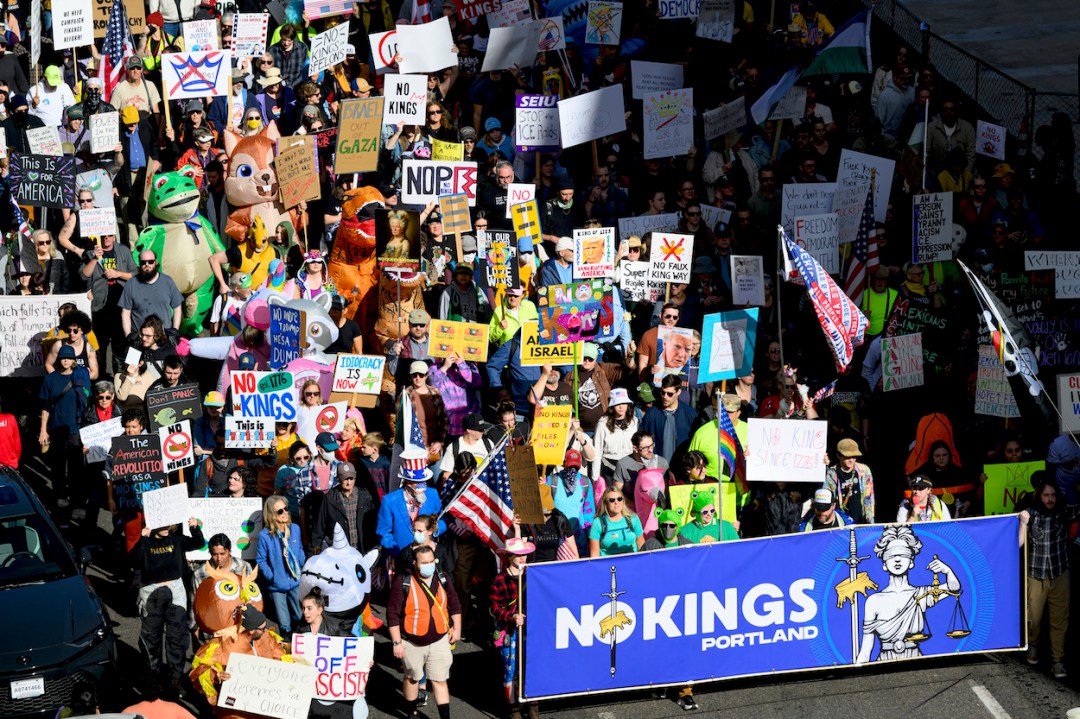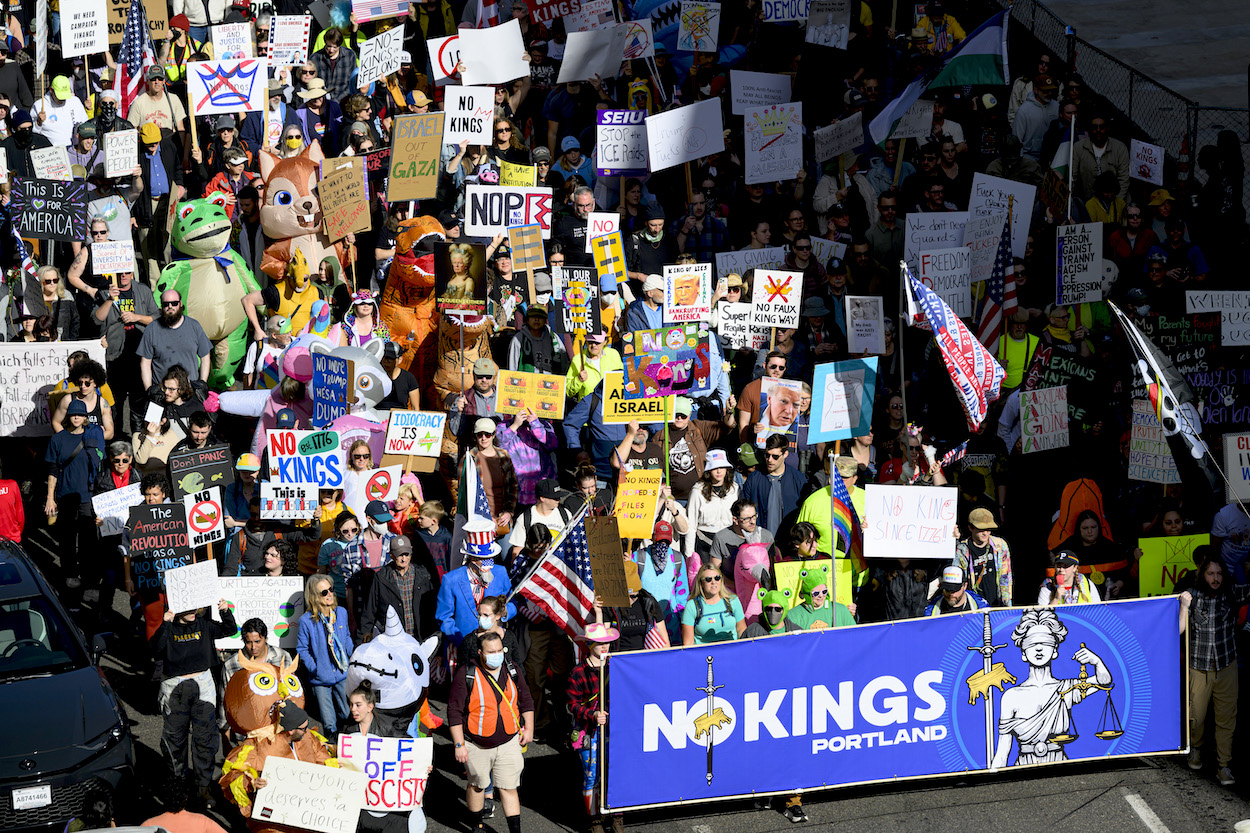Over the weekend, millions of Americans took to the streets in more than 2,000 ‘No Kings’ marches nationwide, protesting what they regard as the creeping authoritarianism of President Trump.
The marches – which Trump’s allies called ‘the hate America rally’ – were notable for their scale, but more importantly they are a symbol of something deeper: the erosion of political legitimacy in the world’s pre-eminent democracy. For China and Russia, the spectacle of Americans turning on their own institutions confirms a long-held belief, namely that the United States is entering a phase of irreversible decline and may soon hesitate abroad.
The data bear them out. In April 2024, 19 per cent of Americans agreed that violence might be necessary to ‘get the country back on track’. By October 2025 the figure had risen to 30 per cent. Protest activity has surged too. According to the Crowd Counting Consortium, the United States now records between 5,000 and 9,000 demonstrations each month, compared with fewer than 1,500 at the start of Trump’s first term. What was once episodic dissent has become a permanent condition of mobilisation, a republic in near-constant confrontation with itself.
In Beijing, the conclusion is already drawn. Chinese state outlets treat the continued unrest as confirmation that liberal democracy breeds chaos. The Beijing Youth Daily has described American politics as entering ‘an increasingly unpredictable and chaotic era’, while other party media mocked ‘the fading halo of American democracy’.
That sentiment echoes a diagnosis first made by Wang Huning, now one of Xi Jinping’s chief ideologues, in his 1991 book America Against America. He argued that the United States ‘is a deeply divided country’ and therefore structurally vulnerable to decay. Xi’s doctrine of national rejuvenation rests on this contrast between order and disorder, endurance and exhaustion. His bet is that China does not need to defeat the West directly, only to wait for America to tire itself out.
Moscow draws similar conclusions. Kremlin analysts see the unrest not as renewal but decay, and take great satisfaction in watching American cities erupt after decades of US support for pro-democracy uprisings abroad. Russian disinformation amplifies footage of the protests, feeding the divisions that make decisive policy impossible.
China’s long game is to replace, not reform, the US-led order. While Washington wrestles with its own legitimacy, Beijing is building the foundations of an alternative system – ports, payment networks, digital platforms and diplomatic blocs that let it trade and finance outside western control. The Belt and Road Initiative has become the backbone of this parallel economy, reinforced by the Shanghai Co-operation Organisation and an expanded Brics. Together they amount to the most ambitious challenge to eestern dominance since the Cold War.
This is why America’s domestic unrest matters. A society that cannot agree on its own direction cannot lead others through crisis. If Beijing were to move on Taiwan, or Moscow to push further into Eastern Europe, Washington’s response would unfold in the middle of a national argument. Every decision would be contested, every deployment politicised, every ally forced to question whether the United States could still act as one.
Strategists now warn of a potential polycrisis: a convergence of geopolitical, economic and technological shocks into a single storm. In that scenario, China and Russia would not need to coordinate. They would simply act within the same window of western distraction. The pressure would be cumulative – Taiwan, Ukraine, energy, cyber-conflict – each shock amplifying the next until Washington’s attention and authority were exhausted. For Beijing this is not speculation but strategy. Its leaders believe the next rupture will come not from confrontation but from timing: the moment when the United States, divided at home, is properly tested abroad.
America’s strength once lay in the belief that disagreement was the essence of freedom
Beijing and Moscow read this paralysis as proof that time is on their side. Both believe that western democracies, worn down by social fragmentation and moral fatigue, will answer pressure with debate rather than decision. The longer Washington’s attention is consumed by its own legitimacy crisis, the more freedom its rivals have to act – cautiously, cumulatively, below the threshold of open war.
The US’s allies are already adjusting. Japan and South Korea are rapidly rearming, unsure of American support, while Europe speaks of ‘strategic autonomy’ as insurance against a distracted superpower. Across the world, former loyalists from Thailand to Saudi Arabia now hedge between Washington and Beijing. The pattern is unmistakable: confidence in American steadiness is ebbing away.
Inside the republic, trust in its institutions is dissolving. State governors defy federal orders, city mayors refuse to enforce immigration laws, and the Supreme Court is viewed as a partisan weapon rather than an arbiter. Presidencies begins under suspicion, with half the electorate convinced the result was illegitimate before the oath is taken. When authority loses moral weight, politics ceases to persuade and becomes a fight for survival.
America’s strength once lay in both its capacity for self-renewal and in the belief that disagreement was not a weakness but the essence of freedom. The Cold War strategist George Kennan once observed that a democracy is peace-loving precisely because it is not sure that it is right. That humility once anchored American power; today it risks paralysing it. The No Kings movement, and the unrest surrounding it, are more than a domestic spectacle. They are the mirror through which America’s rivals now view the world’s leading democracy – a nation that once guaranteed order but now generates uncertainty.
The challenge for Washington is no longer whether it can deter its enemies but whether it can still persuade itself to act. History rarely punishes weakness directly; it rewards those who move while others hesitate. And today the world’s autocrats see a republic that has begun to hesitate – still powerful, yet unsure of its purpose, and increasingly aware that the spirit of contention which once sustained its democracy now threatens to consume it.








Comments